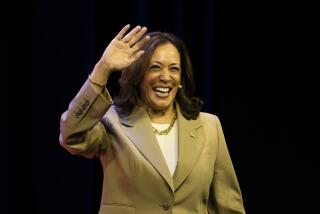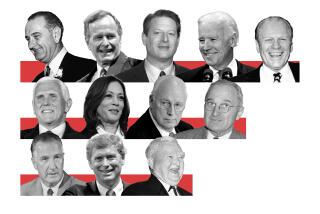Quayle Found No Harm to Bush in 1992
- Share via
WASHINGTON — Most Americans continue to doubt Vice President Dan Quayle’s qualifications to be President, yet, despite President Bush’s recent heart problem, few seem prepared to let those doubts seriously influence their vote in 1992, according to The Times Poll.
The good news for Quayle and his backers is that only one in 14 Americans says that having Quayle on the GOP ticket would be the deciding factor in voting against Bush, and the President’s illness has had little impact on that number.
The bad news for the vice president is that enthusiasm for keeping him on the ticket is limited. Most Americans, including substantial numbers of conservatives and Republicans, favor dropping him from the 1992 ticket.
Overall, the poll suggests that Quayle is a persistent, but small, drag on Bush’s political fortunes, one that could harm Bush, but only in a very close election. The results tend to contradict those political analysts who have argued in recent days that Bush’s illness would cause a sharp increase in pressure to remove Quayle from the Republican ticket before next year’s election.
However, the results are consistent with analyses of the 1988 election indicating that public doubts about Quayle cost Bush only a couple of percentage points, at most, in his race against Democrat Michael S. Dukakis, Times Poll director John Brennan said.
And the poll, conducted Monday night after Bush was released from Bethesda Naval Hospital, suggests one reason why Bush’s recent bout with an irregular heartbeat has had little impact: Overall, most Americans do not believe Bush’s condition is particularly serious. Two-thirds said they believe Bush’s illness is “not too serious” or “not serious at all.”
Nearly three-quarters of those polled said they believe the White House is giving the public an accurate view of Bush’s health, and two-thirds believe Bush’s health should not be an issue in the next election.
The poll surveyed 589 adults nationwide by telephone and has an overall margin of sampling error of plus or minus 4 percentage points. The error margin is somewhat higher for the opinions of subgroups.
People split almost evenly when asked if they like or dislike Quayle--49% view him favorably, 44% unfavorably, with 7% undecided. That profile is essentially unchanged from January.
But, when asked if Quayle “is qualified to take over the job as President,” only 35% say he is qualified, 52% say not qualified, and 13% don’t know.
Nonetheless, when asked what effect Quayle’s presence on the ticket would have on their decision in the next election, 52% said it would have no impact. Although 33% said that having Quayle as the running mate would make them less likely to vote for Bush, only 7% said he would be the deciding factor.
A mere 6% said they would be more likely to vote for Bush because of Quayle’s presence on the ticket, and just 1% said Quayle would be the deciding factor in making them vote for Bush.
Bush’s hospitalization appears to have had little impact on those numbers. Two months ago, in answer to the same question, 5% of respondents said Quayle’s presence would be the deciding factor in making them vote against Bush. The difference between 5% then and 7% now is within the poll’s margin of error.
Similarly, 53% of those polled said they thought Bush should drop Quayle from the 1992 ticket, and 33% said Quayle should stay. Four months ago, the split was 57% to 31%. Again, the difference is within the margin of error.
Not surprisingly, Quayle’s support is stronger among Republicans than among either Democrats or independents. For example, respondents who identified themselves as Republicans said Quayle is qualified to be President by a margin of 56% to 33%.
At the same time, three in 10 Republicans said they were at least somewhat less likely to vote for Bush because of Quayle’s presence on the ticket, essentially the same proportion as in the overall population.
When asked about dropping Quayle from the ticket, Republicans split, with 41% saying yes and 44% saying no. Even among conservatives, Quayle’s natural constituency, 51% favor dropping him in 1992, while 35% would keep him.
In a hypothetical match against a Democratic ticket of New York Gov. Mario M. Cuomo and Tennessee Sen. Albert Gore Jr., Bush won handily regardless of whether he was teamed up with Quayle or with Gen. Colin L. Powell, the chairman of the Joint Chiefs of Staff, who some Republicans have talked about as a possible vice presidential candidate. The hypothetical Bush-Powell ticket beat Cuomo-Gore 63%-20%, and a Bush-Quayle ticket prevailed 62%-23%.
Given a list of possible running mates for Bush, Powell, at 18%, and Quayle, at 16%, were the only two in double digits; a 34% plurality said it had no preference.
Ever since Bush and Quayle took office, opinion polls generally have shown that a majority of the public doubts Quayle’s qualifications to be President.
The percentages have fluctuated somewhat. For example, in a Times poll in early January, just before the outbreak of war in the Persian Gulf, only 19% of respondents said they thought Quayle was qualified to take over the job, and 69% said he was not, a wider no-confidence vote than seen in the latest poll, taken after Bush’s hospitalization.
Brennan speculated that the Iraq war may have made the public more anxious about Quayle’s qualifications.
In January, “people were very focused on the war” and were judging Quayle by the extremely high standard of a potential commander-in-chief, Brennan said.
That result suggests that Quayle could be more of a liability for Bush if the next election was held at a time of national crisis.
Although Quayle’s ratings are poor in comparison with those of some other vice presidents--such as Bush, himself, or Walter F. Mondale, Jimmy Carter’s vice president--his ratings are hardly without precedent. In March, 1956, for example, a Gallup poll showed only 31% of respondents saying that then-Vice President Richard M. Nixon would “make a good President,” while 48% said he would not.
Even worse were some of the ratings of Nixon’s vice president, Spiro T. Agnew. Asked by Gallup in 1970 if they would like to see Agnew as President some day, only 19% of those polled said yes, and 61% said no.
Although Democrats tried to make an issue of both unpopular running mates, neither had a significant effect on the reelection bids of the men who chose them.
Bush and Quayle: An Assessment
The Los Angeles Times Poll surveyed 589 adults nationwide, by telephone, on Monday, May 6. The margin of sampling error for percentages based on the total sample is plus or minus 4 percentage points. For subgroups, the error margin is somewhat higher. Comparison is to past Times poll.
BUSH HEALTH PROBLEMS NOT THOUGHT SERIOUS
How serious do you think Bush’s health problems are: Do you think they’re very serious, fairly serious, not too serious or not serious at all?
Very serious: 5%
Fairly serious: 23%
Not too serious: 48%
Not serious at all: 19%
Don’t know: 5%
QUAYLE FAVORABILITY COMPARABLE TO JANUARY
Impression of Vice President Dan Quayle:
5/6/91 1/12/91 Favorable 49% 44% Unfavorable 44 44 Don’t know 7 12
POWELL NO STRONGER THAN QUAYLE IN 1992 FACE-OFF AGAINST A CUOMO/GORE TICKET
(Respondents were asked the following question two ways, one posing Quayle as Bush’s running mate and the other with Colin Powell as the GOP vice presidential nominee.)
If the 1992 presidential election were being held today and the Republican candidates were George Bush for President and Dan Quayle/Colin Powell for vice president, and the Democratic candidates were Mario M. Cuomo for President and Albert Gore Jr. for vice president, for whom would you vote?
Bush/Quayle: 62% Cuomo/Gore: 23% Someone else: 1% Don’t know: 11% Wouldn’t vote:3% Bush/Powell: 63% Cuomo/Gore: 20% Someone else: 1% Don’t know: 13% Wouldn’t vote: 3%
MOST DOUBT QUAYLE’S PRESIDENTIAL CREDENTIALS
Do you think Dan Quayle is qualified to take over the job as President, or not?
Lib- Mod- Con- Demo- Inde- Total erals erates serv. crats pend. GOP Qualified 35% 24% 37% 40% 16% 29% 56% Not qualified 52 67 53 46 75 59 33
Source: Los Angeles Times Poll
How the Poll Was Conducted
The Los Angeles Times Poll interviewed 589 adult Americans nationwide, by telephone, on Monday. Telephone numbers are generated from a computer list that includes all telephone exchanges in the United States. Random digit dialing techniques are used to ensure that each region of the country is properly represented and that both listed and unlisted residences have an opportunity to be contacted. Results are adjusted to conform with national census figures for characteristics such as sex, race, age, education and household size. The margin of sampling error for percentages based on the nationwide sample is plus or minus 4 percentage points. For percentages based on certain subgroups, the error margin is somewhat higher.
More to Read
Get the L.A. Times Politics newsletter
Deeply reported insights into legislation, politics and policy from Sacramento, Washington and beyond. In your inbox twice per week.
You may occasionally receive promotional content from the Los Angeles Times.










